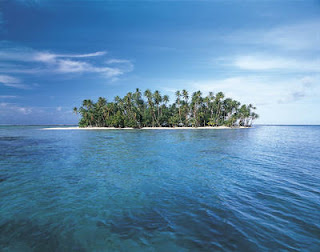
I've been thinking about the last post a lot lately. Mostly as I fall asleep, which is makes it hard to type up. But I'm fairly convinced I have a response.
A quick recap:
A salesman has four bottles of water which he can sell to the two guys who are stuck on an island. One guy has $100 and the other has $10. The richer guy can buy all four bottles at $25 a piece and the poor guy won't get any. Thus the market does not distribute the water based on minimizing thirst.
So what's wrong with that? On, one level, nothing. The market does not make its criteria for distribution thirst minimization, but allocating goods to those who are willing to pay for them.
But the simplicity of this hypothetical example makes the market seem much worse than it would if there I added a couple facets that more closely approximate real life.
The first problem is that there is only one good. So if the rich guy spends all his money on the water, it doesn't matter, he doesn't give up anything to do that. If there were two goods, then spending money one water has a cost (i.e. he can't spend the money on food). Since he gets less and less thirsty with each bottle he drinks, the rich guy is more likely to spend the rest of the money on food which should leave some water for the poor guy to consume.
It is possible for us to increase the amount of money the rich guy has. This would allow him to continue to consume all of the food and water. However, each good we add increases the amount of disparity in money that the guys have to have in order for that to occur. In other words, with as many different types of goods as the real world has, for the poor person to be totally priced out, there would have to be a huge income disparity.
The second problem is that production and consumption are completely separate in the example. People are constrained to consume no more than what they can produce or produce then trade for unless they have wealth flowing to them from some other source.
I'll change the example so that the guys are producing water. One guy produces 4 bottles and the other produces zero. Since the rich guy owns his bottles, the poor guy gets nothing. Again, to minimize thirst, I could take two bottles from the rich guy and give them to the poor guy.
The problem now is that there really are two goods here. One is leisure. The rich guy who produced the bottles had to give up some time to do it. The rich guy lost leisure and water. By reallocating water, leisure is now not allocated equally. Not only do you have to know each guy's preference for water and leisure to allocate the two goods in the fairest manner who have to have some way for the worker to be compensated. Since you can't transfer leisure, that becomes difficult.
My feeling is that the information problem is so huge, that you really can't get much better by reallocating. Any forced reallocation will result in hidden costs that will make the reallocation not as good as it would seem on the face of it and potentially even make things worse. And this doesn't take into account that the process of allocation will change the incentive to produce so that by redistributing goods there are actually fewer goods to work with. So while the market can seem unfair (though it actually isn't as bad as it is sometimes characterized) it does have many good qualities.
No comments:
Post a Comment